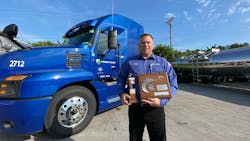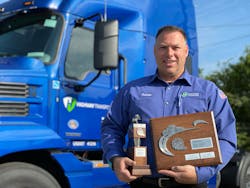Out of the cold: NTTC’s 2021-22 Driver of the Year leaves reefers for tanks
Thomas Frain spent 23 years pulling refrigerated trailers for the foodservice industry, including 18 working for Sysco.
Now he’s towing tanks for Highway Transport—and bulk logistics is better for it.
Bulk Transporter sat down with the veteran driver soon after he secured National Tank Truck Carriers’ 2021-22 Professional Tank Truck Driver of the Year award to learn more about what lured him away from reefers, how he has stayed safe while traveling 2.3 million miles, and what he plans to emphasize as NTTC’s ambassador.
Questions and answers are edited for length and clarity.
Bulk Transporter: How does hauling temperature-controlled trailers compare to tank trailers?
Thomas Frain: “There is an enormous difference between hauling secured and unsecured freight. With bulk products, you have ‘surge,’ and it requires more attention to stopping distances, how you start the truck, and how you ease through a green light or approach a red light, to maintain that cushion between you and the vehicle in front of you.”
TF: “Working in that industry requires a younger body. Coca-Cola did a study years ago that showed the average health expectancy for a ‘fingerprint’ box driver who’s touching every piece of product was 17 years. Then the knees, shoulders, rotator cuff, and that stuff starts to break down. And when I was in my 40s, I started to feel that joint pain, so I was nervous. There was a point in my life where I wondered ‘What am I going to do next? How am I going to evolve? How can I maintain my standard of living?’ And fortunately, when a friend transitioned to the tanker side and called me, I could hear the relief in his voice, knowing there’s something else out there for us, where we can still get home to our families. Bulk deliveries don’t require extensive physicality to do the job, because you’re not actually touching the product. As a foodservice delivery driver, I might have 24,000 pounds of product—and I touched every single piece.”
BT: So loading and unloading tank trucks isn’t as difficult?
TF: “It’s more mental. It’s not so much physical. Yes, there is little bit of physical work, when you’re dragging hoses around, but that’s negligible. That’s like carrying a grocery bag. It’s not that heavy.”
BT: What is one of the most challenging aspects of driving tank trucks?
TF: “It’s the mental awareness because you can’t be unfocused at any point in time. Driving down the interstate, if you touch a median, or there’s a little break in the pavement, it affects the product behind you, so you have to be focused at all times. Whereas, with a box truck, if you rub up against a curb as you round a corner, it’s not that big of an issue. With a tank truck, it’s a huge issue.”
BT: What is the most important factor in safe driving?
TF: “Preparation. It’s not just physical preparation, it’s mental— eating healthy, exercising, and making sure everything you needed to get done at home is done. So when you come to work, you’re mentally prepared for the job, and able to focus on what you’re doing that day.”
TF: “Many. Experience is a word we use to replace mistake. So along the way, there have been many mistakes, to get to this level. When I started at the age of 21, I drove a truck like it’s a car. I wasn’t intentionally being aggressive, but driving as though I was in a car. I would think about getting home, rather than getting the product there safely, and protecting the people around me. That comes with maturity and time. If I were to go back in time, I’d tell myself to relax and focus on the future. This is a career—not a job.”
BT: As Tank Truck Driver of the Year, you’re an industry ambassador. What issue is most important to you?
TF: “For me, it’s promoting the industry. There’s such a negative connotation for drivers and that needs to change. When I talk to somebody who doesn’t know me, sometimes they’ll ask what I do for a living, and when I tell them I’m a truck driver, I’ll get that look, like ‘Really?’ That’s upsetting to me. So I always ask, ‘What does a truck driver look like to you?’”
About the Author
Jason McDaniel
Jason McDaniel, based in the Houston TX area, has more than 20 years of experience as an award-winning journalist. He spent 15 writing and editing for daily newspapers, including the Houston Chronicle, and began covering the commercial vehicle industry in 2018. He was named editor of Bulk Transporter and Refrigerated Transporter magazines in July 2020.



